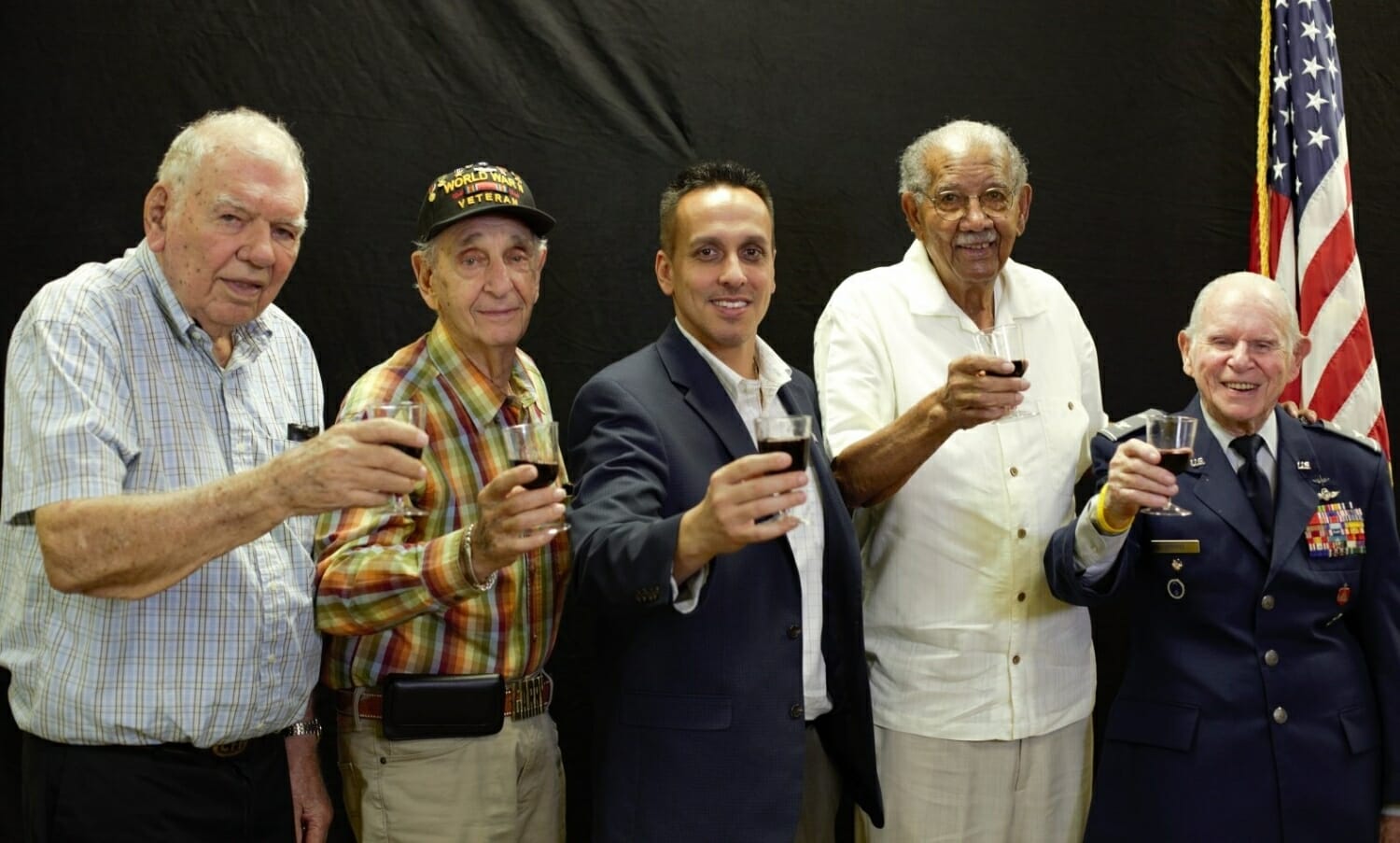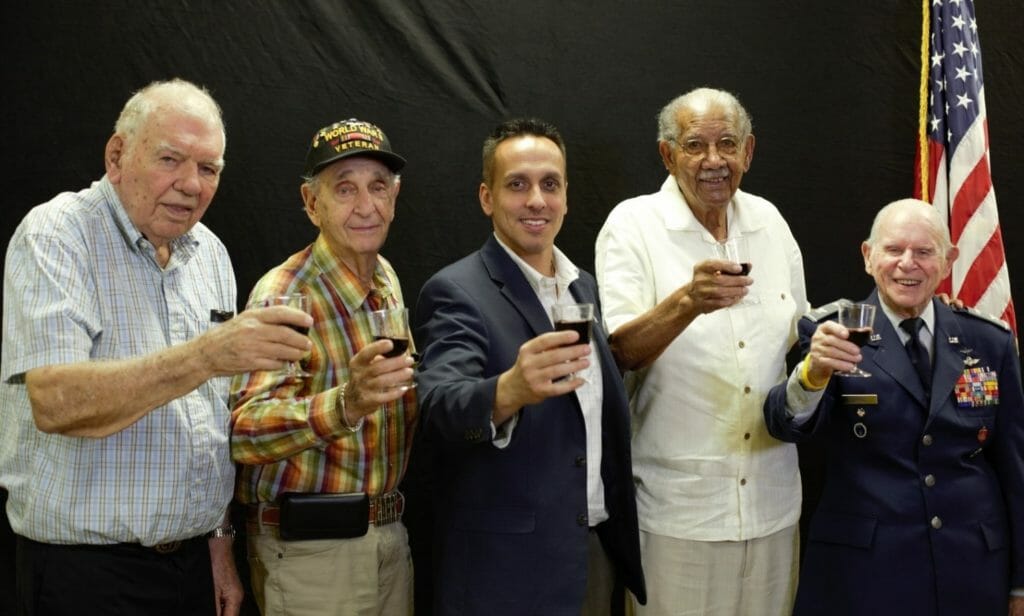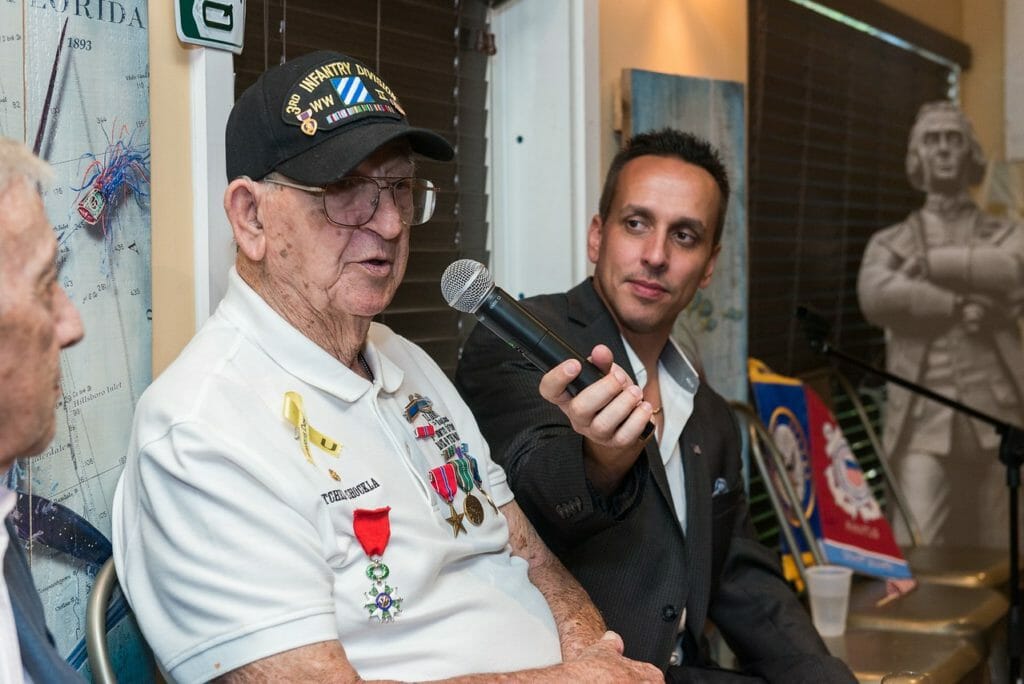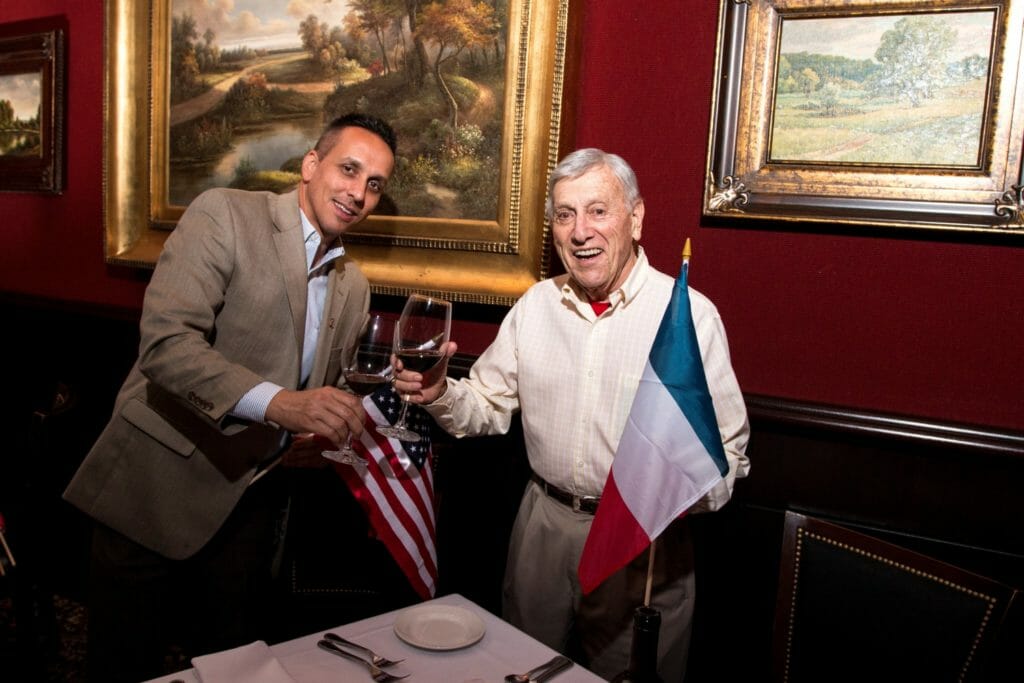Florida Man Helps Honor Hundreds of Veterans for Their Service


A phone call from his brother in 2011 would have a lasting impact on Ryan Paton and the hundreds of veterans he has volunteered for since. After his brother urged him to look up Honor Flight, a nationwide organization that flies veterans to visit memorials in Washington, D.C., Paton immediately reached out to the Honor Flight hub that was closest to him to volunteer to go on a flight as a guardian for a veteran. The Fort Lauderdale resident said the experience was “unbelievable,” and ultimately led to him being asked to help start a hub in south Florida to be more accessible to other veterans in the state. Since then, Honor Flight South Florida has flown 1,300 veterans of World War II, Korea and Vietnam to D.C. since 2012, their 16th flight being just last month. World War II veteran Julian Syphax described the flight experience as “very fulfilling.”
“It made me really glad to be an American and glad I had a part in the memorial,” Syphax, who served in the Navy, said.
With Honor Flight South Florida, Paton also hosts two live events per year called Cocktails with Heroes to honor the veterans and fundraise for Honor Flight organizations across the country. Paton calls the veterans he works with some of his best friends, and is currently writing a book and filming a documentary that profiles the veterans as a way to honor them further.
“The fact that people acknowledge what we did in those days, 70 some odd years ago, it’s a very satisfying thing to know we’ve been appreciated,” World War II Army veteran Larry Weston said. Weston has gone on an Honor Flight to D.C. and attended Cocktails with Heroes, where he has been the guest of honor. “I walked all the way across France into Germany, across Germany into central Austria,” he added. “The day I went on the flight was worth every step of the way, that’s how wonderful it was.”
Paton is today’s Daily Point of Light Award Honoree, and we spoke with him about why he chooses to dedicate his time to Honor Flight South Florida.
How did you first get involved with Honor Flight South Florida?
My brother called me up in 2011 and he said you have to check out this organization, you would love it. You fly World War II vets to Washington. The closest one was about two hours away north of us. So I called [Southeast Florida Honor Flight and Honor Flight West Central Florida] and said ‘Hey, I’m interested and I can help you guys out fundraising, do whatever, and I would like to go on a flight.’ [Southeast Florida Honor Flight] called me back and said ‘Hey, drive up here, meet us.’ So I drove up there and I paid my $400 and I went as a guardian in 2011. As a guardian, anybody can go, you just pay your money and you get teamed up with a veteran. A couple weeks later, I did a fundraiser in Fort Lauderdale and I raised like $3,500 in two hours. I took that money and gave it to the Honor Flight Southeast Florida. And [the organization] said, ‘How would you like to help us out and start a hub in south Florida?’ I said ‘Absolutely, whatever I can do.’ I went on another flight with them as a staff member so they could teach me everything that I needed to know. Myself and three other guys got together, we started having meetings. When you’re trying to recruit veterans who have no clue what Honor Flight it, it’s hard to fill the hub because they have to trust you, their families have to trust you because you’re taking them to Washington, D.C. from Florida. So our first flight, we had 16 World War II veterans on the flight. Honor Flights charter full planes but you have to start somewhere. Our first ever flight was only 16 World War II veterans and we had 3,000 people show up at the airport to welcome them home which is the biggest crowd probably in any hub ever.
What is a typical trip like for the veterans?
The veterans get picked up by their guardians. The guardians have probably taken them to lunch or dinner so they have a good relationship already. The guardians pick them up about 4, 4:30 in the morning and get them to the airport by 5. The guardian takes them, checks in, then we have a beautiful picture board where they get a picture together. Then they go upstairs to the terminal, we have a beautiful breakfast for them with coffee and everything. Every step of the way, even at the check in, people are thanking them and doing stuff they normally don’t get. We charter their planes, we get on the microphone talk to them, give them a cool experience. Then when they get to DWI or Dulles or wherever we fly into, we have active duty military from Fort Meade at the gate waiting for them. We get a full police escort when we go to Washington because you can’t go to five different memorials in one day. Even a healthy person can’t do that with all the traffic. So we’re able to hit all these different memorials, Arlington National [Cemetery], Iwo Jima [Marine Corps War Memorial], the [National] World War II Memorial, Air Force Memorial. And then on the plane ride back we do what’s called mail call. Our staff has contacted the veterans’ families from all over the country and we’ve gotten letters from all the family and friends, which the veteran doesn’t know. So when they’re on the flight home we call them out by their last name like they’re in the military for mail call. We give them this beautiful package that local high school kids help make. They get this package and they’re reading these letters from family members that they don’t really get to see, might not have talked to in awhile. On my first flight, I had to read the letters to the guy because he had trouble seeing, and I had to put my sunglasses on because I got so emotional reading these letters and watching him cry. It’s just a cool gift to give, not only for the veteran but for the family, because the family gets to have an opportunity to tell their loved ones how they really feel about them. We get off the plane, then we have the homecoming. The homecoming is what I think is the most important thing. People think these guys came home from World War II and they all got this big parade. I have veterans who came home from World War II, fell asleep on the subway and got robbed. So some of them had a horrible homecoming when they got home, especially the Korean War veterans and the Vietnam veterans. So it’s such an incredible honor to be able to give these guys. [During the most recent flight], these guys were coming to 2,500 people waiting for them, waving the flags, crying, hugging them, and they all get so emotional from it. It’s a gift that money can’t buy to finally give this to them. This welcome home is one of my favorite parts of the whole Honor Flight. We had a DJ playing, we had two congressmen were there, police departments, we had a two star general who was waiting at the gate for them, 15 active duty soldiers were there. So it was a tremendous homecoming. They say it was the best day of their life.

Describe your volunteer role with Honor Flight South Florida.
We fly four times per year so that leaves 361 remaining days to raise funds, to recruit veterans, to recruit volunteers. But one of the things that I’m most proud of is we take these World War II veterans to all the local schools in Miami, in Broward County. We have them speak to the students. About five years ago we came up with an idea about bringing World War II veterans into the school and having the elementary school kids put on a performance for them. These elementary school kids know more than high school kids about World War II. The fact that we’re bringing live world history to these kids so even when they get into high school, most likely all the World War II veterans will be gone by then, but they’ll be able to talk about it. Talk about the people they met, real history. That’s something that has nothing to do with flying veterans to their memorial but the veterans will love it because they know they’re passing history off and obviously the teachers love it, the kids love it. I probably do six, seven events per year. I just want to get these voices out there because we have so many interesting veterans in south Florida that come from all over the country, and I want to get them out and kind of be their microphone and let them speak. They might be in their 90s but they’re still young at heart. They’re just great people. It’s not just about the four flights per year. We take these guys to the doctors, we take them to visit family. We take them to lunch, we take them to dinner. It’s a constant thing, Honor Flights.
Describe Cocktails with Heroes.
So I became really good friends with five or six World War II veterans since my first flight and one of them is a black American vet who served our country when our country wouldn’t serve him. I became good friends with him and we golfed together. We would drink beers and golf and then we would go back to his house and we would watch golf on TV and drink more. It was like he was 17 again and we were just friends. I look at these guys like they’re young. When I have these Cocktails with Heroes events, I don’t play World War II music, I play today’s music because I don’t want you to look at these people like they’re 95 years old, because they were kids when they went into World War II and fought this war. That’s how I feel when I’m with them and they feel the same way, they feel younger and enjoy hanging out with me. So I made it a thing, I like to drink a cocktail from the country that they liberated. The first event I did was a live event and I had seven World War II veterans that liberated seven different countries. I had a seven-course dinner with seven different cocktails from each country that they served in. I got Capital Grille to shut down the entire restaurant and give it to us. At the restaurant, I had all the veterans meet at a location and they got on a limo bus. The limo bus pulls up to Capital Grille and I had all 200 people outside waving flags, so I gave them another kind of homecoming. Then they got a red carpet entrance with the Miami Dolphins cheerleaders and took pictures. Then we all went to the dining room at the Capital Grille and I did a whole kind of presentation with the veterans. Each course was a different country and I had them come up and did a Q&A with them. Like I said, I know these guys very well and I know their stories. I don’t do anything about fighting and all the bad stuff about the war, what these guys saw and went through — I try to tell a different side of World War II. I’ve raised close to about 80,000 dollars from the live events. One hundred percent of every dollar goes directly to Honor Flight.
Why is it important for veterans to go on these trips?
We’re finally thanking them for what they did. To give the gift of saying thank you and we’re never going to forget what you did. There’s a quote from [Former President] Eisenhower that the world must know what happened and never forget. So we’re kind of keeping these voices alive and keeping the memory of the 407,000 Americans that died in World War II. It’s an important job that we do, not just giving them the thanks but also preserving what these people did for us.

What’s been the most rewarding part of your work?
I think the most rewarding part is the families. When they come up to me and I sit and talk to the families. When [the veterans are] staying alive, I know they’re staying alive for the stuff that we do. It gives them a reason to want to live and I wish I could do it with so many more veterans. But when the families come up to me and they cry and say thank you for what you did and I say, ‘well, the jokes on you, because they do so much for me.’ Everybody thanks me for hanging out with them — I hang out and drink expensive wine with world heroes. That’s like a dream come true for any American. It’s so much fun for me to do it.
What have you learned through your experiences as a volunteer?
I’ve learned so much from [the veterans]. As far as the war goes, I learned stuff you’ll never read in history books, stuff you just don’t know. I’ve always been a history buff, especially about World War II. I’m getting stories that are untold. What I’ve learned, that’s why I’m doing this, because this stuff is so interesting, the stuff I’m learning. Most people don’t really get into the good parts of World War II, the side stories. There’s so much history that I’ve learned but the message is from the veterans. If congress would listen to these veterans and use them when they make decisions, it would be unbelievable. They might be in their 90s and close to 100 years old, but they’re so smart, they’re so sharp. Whether they’re Republicans or Democrats, I ask them questions and I decide how I’m voting because of the input I get from them. They have a different view of life [because of] what they went through. They grew up in the Great Depression, they went to war when they were kids, they rebuilt America. These people are so smart and so humble. I learned how to behave, I learned how to be a better person. They’re phenomenal people and if I could just give a little bit of these people, show a little blueprint of what it takes to be an American and how lucky we are, what these guys went through — it’s fantastic.
What do you want people to learn from your story?
We have Veterans’ Day, we have Memorial Day, where we thank these people for what we have, because we would be a different country if it weren’t for what our veterans do. Every time you see person with a Korean War hat, a Vietnam hat, a World War II hat, Iraq, Afghanistan — walk up to them and acknowledge them and thank them for what they’ve done for serving. Always go out of your way. Don’t wait until Veterans’ Day and Memorial Day, you can do this every day. Every restaurant you go to, you’re going to see a Vietnam, Korea, World War II, Iraq, Afghanistan veteran. I didn’t walk up to veterans and say thank you for your service until I got involved with Honor Flight. I didn’t know if they didn’t want to be embarrassed or anything, so I never did that before, and now I’m teaching elementary school kids how to do it and they love doing it. So that’s what I want people to get from this article, go out of your way for them. There’s so many good organizations, not just Honor Flight. Honor Flight, we’re serving our nation’s oldest and most revered World War II and Korea and Vietnam veterans that are kind of at the end of their lives, but there’s still the younger generation. There are so many good organizations that are helping these guys. They have PTSD and the suicide rates are unbelievable, so there’s so much help we can give to them if we just stop for a second and give the effort.
Do you want to make a difference in your community like Ryan Paton? Visit All For Good for local volunteer opportunities.
Post written by Morganne Mallon.
